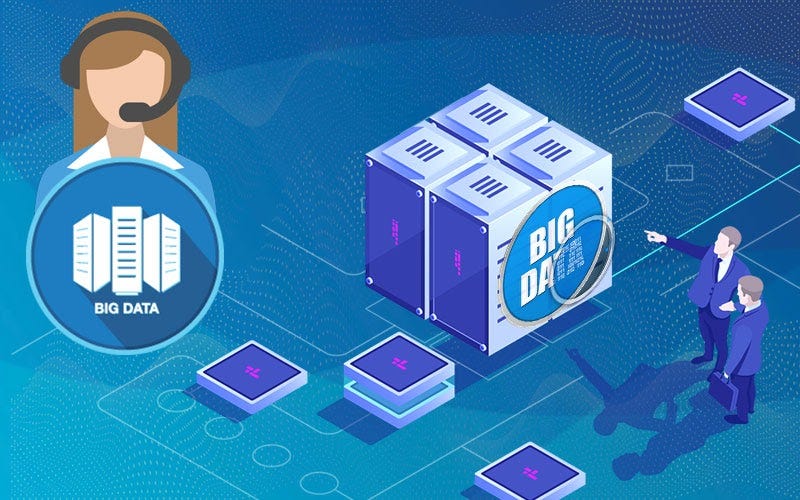
The Impact Of Big Data On The ECommerce Industry

In recent times, there has been a massive growth in the eCommerce industry. The eCommerce business in India is expected to generate $ 100 billion in revenue by the end of 2020.
Also, the market base for e-commerce portals is growing at a fast pace. The number of digital buyers is projected to increase from 58.3% in 2016 to around 65% in 2021.
E-commerce has become a game-changer in the past few years. With so much data at hand, it becomes easier for businesses to implement some data analytics in e-commerce, which will have a more significant impact on business decisions.
With the increase in digital consumers, organizations take advantage of technologies that can help them to enhance the customer experience and increase the number of customers they retain.
Nowadays, companies hold enormous amounts of data, so it is essential to extract actionable information from this data. Big data analytics helps companies obtain information that can help them make the right decisions.
Therefore, you can also contact a software consulting company to implement Big data and let you stand amongst your competitors.
Here, in this article, I will discuss the impact of big data on the eCommerce industry. Before moving further, let’s understand what big data is.
What is Big Data?
Big data is a field that treats ways to analyze, systematically extract information from, or otherwise, deal with data sets that are too large or complex to be dealt with by traditional data-processing
You might be wondering what eCommerce analytics is? Well, this is nothing but the process of collecting and analyzing online purchasing activities on your site or app.
How Big Data Is Impacting eCommerce?
The availability of data has created an opportunity to use past trends and demonstrations for growth, allowing companies to improve customer satisfaction through improved products and services.
Let’s see the impact of big data on the eCommerce industry.
As a customer, each individual likes it when their retailer already has an idea about their choices, and they don’t have to waste much time in selecting the services they need.
With big data, it becomes much easier for companies to keep track of the browsing history of their users. By doing so, companies can analyze a customer’s preferences within no time.
Product promotions can be personalized with the help of advertisements or via emails sent out regularly to notify customers of customized services.
Combining the search and shopping history of consumers and visitors will create an excellent personalized shopping experience. This would lead to higher conversion rates.
By looking at the stiff competition in the eCommerce industry, eCommerce personalization has become practically a necessity.
87% of customers say that when online stores customize their shopping experience, they are motivated to buy more. And it plays a crucial role in customers’ purchasing decisions.
Here, Big data plays its role; it helps by providing insights on customer data and demographics. This data is beneficial in creating personal experiences. Some of the uses of eCommerce big data are:
- Send emails with personalized discounts and unique offers to engage customers.
- Provide customized shopping suggestions.
- Create flexible cost, that relies on external factors such as end-user request and value of competitors.
- Present targeted advertisements on social media networks, as different customers want clear messages.
3. For Predicting Trends

By launching the trending services for the mass to avail is one of the factors that can escalate the popularity of online retail stores.
With the help of big data analytics, companies are now able to analyze data coming from social media and various other forums where a particular product is trending, and now they can know the feelings behind it.
Using such information, enterprises determine which products are trending and how they should grow to ensure up to the mark in the competition.
Automating mundane work not only helps in saving human resources but also enhances the experience of users. For example, using chatbots, they are used in customer service to upgrade precision and response time.
It would be best if you looked for ways to automate repetitive tasks by asking every employee to describe their work. But keep in mind that not all jobs are automated, many have variations that also require human intervention.
Using Big data, marketers can concentrate on understanding the customer and leveraging mass public data on social media sites. Retailers will opt out of using promoter scores and surveys to analyze qualitative and quantitative information.
Merchants can begin by manually categorizing customer opinions and prospects around product types and the overall business. Over time this data can be collected for ongoing insights.
The Automated language, well-organized shipping, currency translation, and local payment options will help merchants enter global markets with little investment.
Human translators are even becoming less expensive these days. Shipping platforms and plugins can calculate the exact worldwide transit cost at checkout.
Business intelligence tools can now predict sales, optimize prices, and forecast demand in detail. The result is a low inventory volume and targeted promotion based on the need for a product.
Businesses can grow fast without spending a lot of money. To begin, traders can acquire an intelligence platform or employ a machine learning expert who can perform predictions in R or Python.

Active customer service is the reason for the success of any e-commerce business. According to a survey conducted by Deloitte, 72% of companies believe that they can use analytics reports to enhance their experience of the customer.
So Big Data will help identify and resolve critical issues and enhance their processes so that customers enjoy doing online transactions. Customers will experience happiness which will be a big boon for their growth.
In modern days, marketing is becoming highly sophisticated. Vendors have to send multiple email variations based on customer segments. For example, if a customer buys only one Shirt, sending him an offer for Shoes will be ineffective.
Similarly, customers who purchase only discounted goods will likely not respond to full-price offers. Marketing to both types of customers requires collecting and segregating data.
Online fraud is another barrier for an e-retail company to function efficiently. By using big data, organizations can provide intuitive information about locations where credit card fraud often occurs.
Big data enlighten organizations about locations where the cash-on-delivery method is experiencing payment failures.
Using such critical information, officials can quickly determine how they can avoid falling prey to such situations and avoid harm.
Big data analytics is proving beneficial to all; With the help of this technology, it is possible to transform the online retail sector. CTOs and CIOs can now focus on understanding how they can take advantage of this technological trend.
Either they can train their employees to work on BIG Data software, or they can hire experts who can help them extract essential insights from the data.
Governments worldwide are enforcing strict privacy laws on the collection and use of consumer data. Merchants will now have to spend money on legal fees, employees (e.g. data compliance officers), and consultants. Marketing capabilities will decline as per customer experience.
In order to provide an extreme experience of purchasing, customers must be aware that their transactions are done in a secure manner. Through Big data, it is easier to determine the different spending behavior and inform customers when it occurs.
By using the Big data analysis, organizations are able to set alerts for various fraud activities, like different purchases on the same credit card.
Big data provides real-time analytics to capture information in the user base. Detail about customers’ demographics and how they navigate eCommerce stores provides much knowledge and lets you make revenue by individualizing the user’s experience.
In addition, insights are excellent to guide your eCommerce tactics by interpreting the traffic and transactions you earn in a retail store.
Taking the feedback of customers is very important for companies that are seeing improvements in their businesses.
The growth of an organization directly depends on the satisfaction of its customers. The more joyful the customers, the more they will be engaged in services.
Analyzing customer feedback provides actionable insights not only to create a better customer experience but also to improve existing products or services.
Final Words
Big data is changing the world very fast, making it easy for online stores to be successful and useful. The Impact of Big data on eCommerce is going to give a remold to the eCommerce industry.
The technology can get you ahead and get the most benefit with better results. You can go for an eCommerce development company in India to take advantage of Big Data, as big data in eCommerce can support businesses in transforming their operations.

I am a technology geek and work with PixelCrayons as a Sr. Technology Consultant. I possess in-depth knowledge of different web development technology and helps my clients to choose the best technology as per their needs.
View Varun Bhagat`s profile for more



Leave a Comment